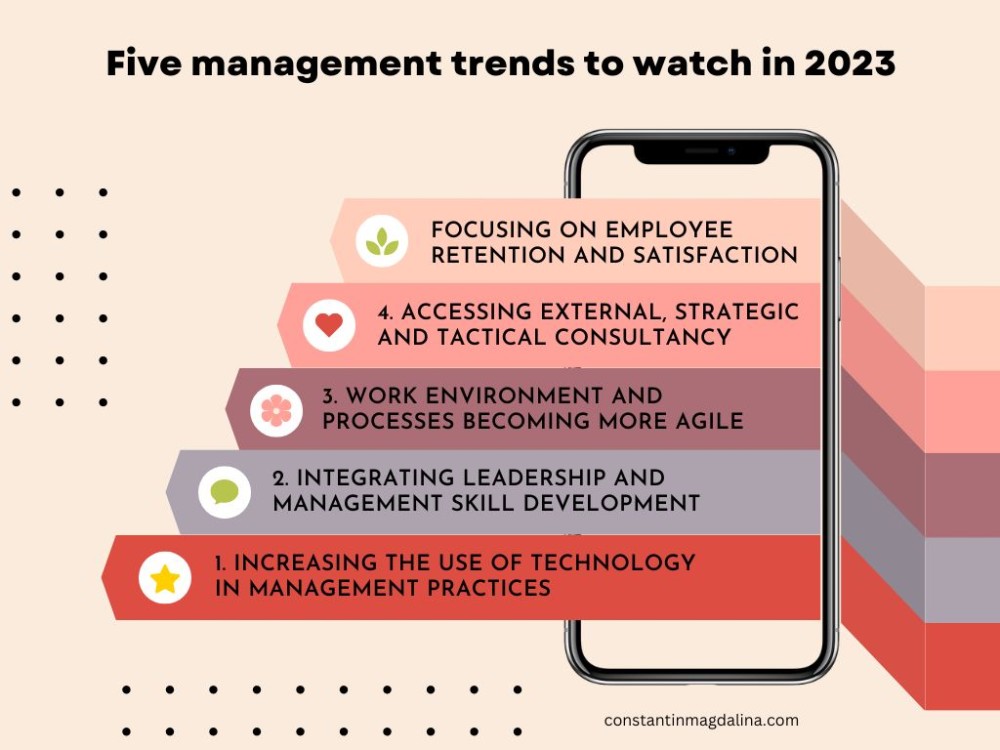In 2023 the business environment will prove to be increasingly complex and competitive for companies. Some of the key challenges anticipated by management teams include the following:
• Increased competition that can make it difficult to attract and retain customers.
• Technological changes to which companies must adapt quickly to remain competitive.
• High costs caused by raw material prices, increases in wages, and taxes that hamper profitability.
• Changes in legislation that add costs and make it difficult for companies to operate.
• Environmental issues, the impact of ESG regulations, as well as sustainability requirements.

In order to successfully manage businesses in this ever-changing economic environment, managers' skills will need to evolve. Thus, the new modern management trends that training initiatives will need to take into account in 2023 to better prepare managers to achieve success with their teams are as follows:
1. Increasing the use of technology in management practices
In recent years, there has been a significant increase in the use of technology in management practices. This trend is likely to continue as companies strive to remain competitive in a global marketplace. There are many advantages to using technology in management, including transparency in communication, improved collaboration, increased efficiency, and better decision-making. That's why there's no doubt that technology can be a powerful tool for managers looking to improve team performance.
2. The work environment and processes are becoming more agile
Numerous applications connect teams worldwide and help companies to be more agile than ever before. Reconfiguring teams has never been easier, which puts employees on an equal footing and removes hierarchical structures from the workplace.
Working in small teams of 7-10 people, with accelerated work processes and quick-to-market approaches changes the way management is done and proposes a new social contract between manager and team. To stay competitive, speed and innovation are vital for companies. Management decentralization, the process that flatten companies, will accelerate in 2023.
3. Integrated development of leadership and management skills
Leadership and management will need to evolve and use a wide variety of training and development modalities to equip modern leaders with the skills they need to perform.
Using a unified approach to developing leadership and management skills allows classroom courses to be seamlessly interwoven with online webinars and tutorials, followed by mentoring and coaching sessions that managers can easily fit into their day without disrupting their schedule too much .
The flexibility of blended learning environments makes it easy to keep pace with the development of managers' skills in the hybrid work environment as the company scales and grows.
4. Access to external, strategic and tactical consultancy
Once managers accept that they don't know or don't need to know everything, the opportunity opens up to bring in outside consultants to transfer their relevant knowledge and experience.
External consultants can bring experience and specialized knowledge in a certain industry or field of activity, which helps the company more easily achieve its goals and solve the problems it faces.
Consultants can be hired for shorter or longer periods of time and can provide learning opportunities for company employees through the transfer of knowledge and experience.
5. Focus on employee retention and satisfaction
In today's business environment employee retention and satisfaction are more important than ever. The competition for talent has forced companies to do everything they can to keep their best employees happy and engaged.
One way for management to do this is to focus more on retention strategies, starting with identifying the factors that make employees want to stay with the company.
Creating programs and policies to provide more flexible work arrangements, improve benefits and compensation, and provide training, mentoring, and coaching is also important.
About Constantin Magdalina
Constantin Magdalina has 15 years of professional experience, during which he worked for multinational companies, both in the country and abroad. Constantin has a Master's degree in Marketing and Communication at the Bucharest Academy of Economic Studies and graduated from an EMBA program at a US university. He is LeanSix Sigma and ITIL (IT Information Library®) certified, which facilitates a good understanding of processes and transformations within organizations. The certification obtained from the Chartered Institute of Marketing completes his business expertise. He initiated and coordinated studies about the business environment in Romania. He participates in numerous business conferences and writes on topics related to innovation, streamlining business processes, social media, digital transformation, emerging trends and technologies.

































